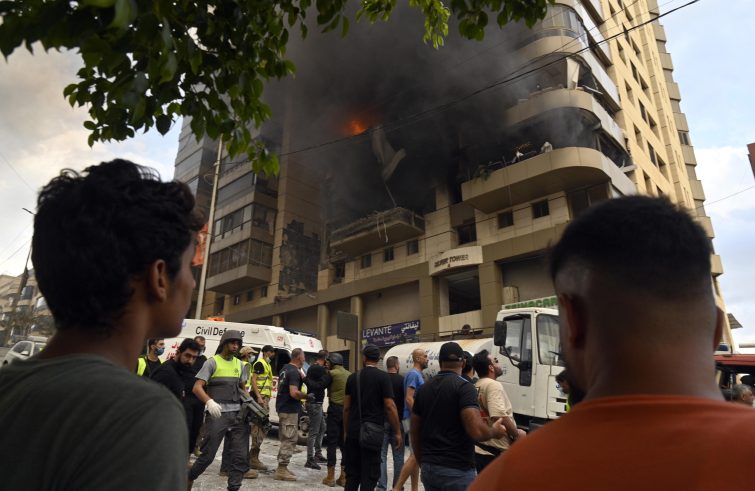
“The situation is bad, really bad. The people are in a state of total exhaustion. There are more than 120,000 evacuees. Many have taken refuge in schools or public buildings. But a large number are still on the streets. Some have decided to flee to Syria, Jordan. Others have fled to Iraq”.
Msgr. César Essayan is the Apostolic Vicar of the Latin Catholic Church in Lebanon. In a telephone interview with SIR, he provides an immediate “snapshot” of the situation in the city of Beirut at this time marked by mounting tensions. The vicar keeps a watchful eye on the latest news. “We can’t go on without non-governmental organisations. The government has no contingency plans and is also struggling to respond because Israel is bombing Lebanon all the time. There are few moments of calm, but day and night we can hear the sound of aircraft crossing the sky.” Bishop Essayan mentions the MK spy plane.
“It makes a specific noise that we have all become familiar with. It’s a constant buzzing sound that heightens the tensions.”
There has also been the killing of Hezbollah leader Hassan Nasrallah. How did it impact on the situation?
The situation deteriorated also because while this man might have been considered a terrorist by a large part of Europe, for the vast majority of the Lebanese people he was the one who kept Israel at bay, regardless of all that could be said about him. For one million Shiites and a large number of Christians, it was he who guaranteed some stability in the country. He had the power to keep Israel in check until Israel took over thanks to its secret services and its very advanced technology.
How are you all?
We are all in a state of turmoil and confusion. We are all terrified. Nobody gets any sleep. No one is at ease. No one is feeling peaceful. A study showed that two-thirds of the Lebanese people suffered from depression even before these bombings.
Today we are at the end of our tether, all of us. After fifty years of war, we can’t see a glimmer of light.
The country was severely impacted by an economic crisis. Moreover, Lebanon remains without an effective national president.
This has culminated in a political deadlock.
Parliament is holding the country hostage. MPs have been asked to elect the President of the Republic for months: it is their responsibility to do so as soon as possible. This is a necessary step to enable the Lebanese State to assume its responsibilities fully, both domestically and in its relations with other nations. This situation cannot continue indefinitely.
You mentioned the situation of the evacuees. What are their most urgent needs?
Their needs are being addressed in many ways. The World Food Programme is distributing thousands of food items and warm meals. Mattresses have already been delivered in large numbers. All sorts of relief supplies are pouring in.
But this is not what we really need. We need Israel to stop and agree to a ceasefire that will give us all a chance to recover and have some respite.
Then we need to provide shelter for the evacuees. We are approaching winter. Blankets are being delivered. But I repeat, we should not limit ourselves to short-term needs, it’s a question of looking further ahead, which means seeking a political solution and not a military one, which leads to a dead end.
Pope Francis gives voice to your voice. During the Angelus prayer and again during the papal flight from Brussels to Rome, he warned against the risk of “disproportionate” defence in war. What is your opinion?
First of all, it is necessary to acknowledge the continuous, uninterrupted efforts of Vatican diplomacy to find a solution to our problem. And we appreciate and thank them for their efforts, not since now, but for years, aimed at finding a just solution, not only for the Lebanese people, but for the whole Arab world and for Israel.
What worries you most?
We are not worried about today, but about tomorrow. What will happen to our young people, to our children? We are educating them to become deeply resentful adults. That is our fear. So we can find solutions for today, but the danger is that we could be preparing a breeding ground for the outbreak of war tomorrow.
The war must stop, and it must stop now, lest it flare up tomorrow in ever more cruel and insane forms.
For this to happen, however, we must all stop and rediscover our humanity, a humanity that we are increasingly eroding in the name of who knows which vested interests. All that remains for us to say is to repeat the words of Pope Francis. Be it the Abu Dhabi Declaration, be it the Fratelli Tutti document, be it all his pleas: to step out of ourselves in order to leave a better world for our children.
Are we igniting a fire in the hearts of the younger generations?
We are, and we have no right to do so. We are robbing the future of so many young people who today can only dream of revenge tomorrow. This is not acceptable. Children have a right to life, they have a right to dream of life.











